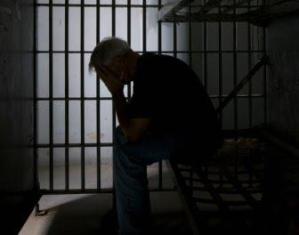Imagine the following scenario:
You are being held hostage by a group of armed men and women. You know they are a very large and well-financed group, and that escape is nearly impossible. Representatives of this organization--a few of whom even claim to be working to protect you--give you the following choice: You may agree to be their prisoner for a specific amount of time, perhaps a few months, perhaps a few years. You will also be giving up most or all of your material possessions, agreeing to proclaim publicly that you have done some terrible deed to earn this captivity--thus destroying your good reputation, if you have one--and even relinquishing some of your human rights. The alternative is to agree to play a twisted, sadistic, and highly rigged game, one which you have very little chance of winning; even your own so-called allies assure you of this fact. They tell you bluntly that the game is stacked horrifically against you, and that your ruin will be sought assiduously by your opponents, using all of their considerable resources. If you lose, they will keep you prisoner for a far longer period of time than you had been offered--perhaps even for the rest of your natural life, and your imprisonment will entail risks to your health and the risk of death--and you will lose all that you would have agreed to give up anyway. The choice is yours.
What would you do?
This is the choice faced by those who find themselves in the American criminal justice system and are offered a plea bargain.
The plea bargain system, for those of you who are unfamiliar with it, is essentially the process I have described above. An accused criminal (already assumed guilty by the State, whose Prosecutors are tasked with winning, not with actually finding the truth), is given the option of pleading to a specific charge and agreeing to the imprisonment and/or other punishment entailed therein. If the accused does not agree, he or she is assured by the State that they will seek the harshest possible sentence available to them under the law, and they have the influence to make it stick.
Some might currently be thinking, "Well, but the accused has the right to legal representation," and this is, technically, true. However, the Prosecution works within the criminal justice system every day, all day (except weekends and holidays, of course), and thus knows the ins and outs of the judicial process better than almost anybody else. They have political pull, they know the judges...and they know the police, who can be relied upon to go along with their prosecution, since the police and the Prosecutors depend upon each other to achieve their goals and thus to move up in their particular careers. If one has a great deal of money, of course--and I do mean a great deal--one can hire a private defense attorney, but most of those who are brought before the criminal justice system do not fall into that category. The usual suspects are, instead, relegated to the Public Defender's office.
I have serious respect for the Public Defenders, as a general rule. They take on a thankless and even reviled role, which many of them do for purely idealistic reasons, believing (unlike a good fraction of their counterparts) that every person is innocent until proven guilty, and deserves a fair trial with a vigorous defense. Unfortunately, individual Public Defenders tend to have ridiculous numbers of cases--measuring into the hundreds at a time--and lower budgets than the Prosecutors' offices have. This fact, of course, runs counter, in principle, to the very idea of "innocent until proven guilty". If we were living by that moral code as a society, we would surely give our Public Defenders better resources than their opponents, who after all have their own budgets in addition to the help of local law enforcement.
According to the Constitutional Rights Foundation, more than 90% of all criminal cases never go to trial, but are instead settled with a plea bargain. This is often seen as a good thing for the defendant, a way for them to reduce their potential sentence. However, what it really represents is a means by which the State can achieve the conviction of an accused citizen without ever having to go to the trouble of proving their case. This is especially true when the accused comes from a lower socio-economic background, but it is by no means confined to that group. Any person who finds him or herself brought before the courts is, of course, terrified...especially one who is innocent, ironically enough. Even the reasonably wealthy do not have resources in the same league as the vast, monolithic, and merciless machine which is the State's criminal justice system. The accused in a criminal proceeding faces a dilemma rather akin to being given the choice of either playing a round of Russian roulette or being shot outright. It is impossible for a defendant to make a rational, honest decision in his or her own best interest in such a situation. And though Defense attorneys are there to help, they are, as I said, overworked and underfunded. In addition, Defenders have to see and work with the Prosecutors day in and day out. They tend not to make waves over what they see as minor cases, because they might want or need a favor in the future on some case of greater political import. This is not done out of some moral failing on their part; it is done out of simple, brutal necessity.
When an accused makes his (or her) statement before a judge, announcing that he is pleading guilty to a particular charge, as part of a plea bargain, he is asked by the judge if he has been threatened or otherwise coerced into making this plea. Of course, if he answers anything other than "No," he will not have his plea bargain available any more, and he can rest assured that the Prosecution will be livid, and will pursue his ruin with even greater fervor than they might have otherwise. Yet to pose the question at all is a sick joke, for the true answer is always and inescapably "Yes." A defendant who accepts a plea bargain always does so under threat--and it is a threat of force, since it entails being taken to prison in shackles, by armed men and women, and being held there against his will a long period of time. It is a rare situation indeed in which a person would plead guilty without being under such a threat. The accused knows that truly fair trials are very few and far between, especially for those who do not have a great deal of money, and for those in ethnic minorities. He almost always--90% of the time, anyway--takes the seeming lesser of the two evils on offer.
If our society does not have the resources to give a full and fair trial to every person who is accused of a crime, then rather than institute a biased, extortionist, abusive system of plea bargains, we should simply not opt to arrest and prosecute so many people. There are real crimes to prosecute; we should apply appropriate resources to those crimes, and this includes providing for the actual fair trials of the defendants. We should never bully or railroad any American citizen into a prison sentence under threat of a worse one.
I will be writing more about this subject, and other aspects of the criminal justice system, in the future. I encourage you to respond with comments, and share your views and experiences, whether you agree or disagree with me. I, in turn, will do my best to engage in honest conversation with you.


No comments:
Post a Comment